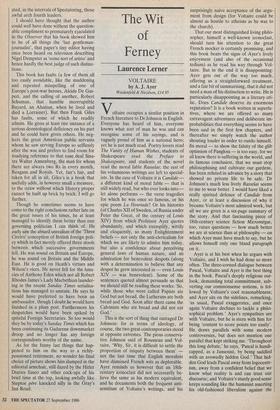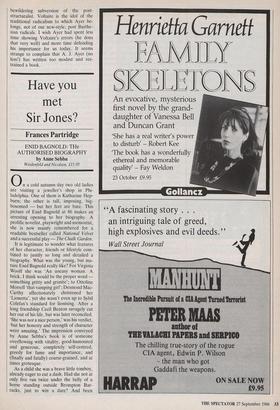The Wit of Ferney
Laurence Lerner
VOLTAIRE by A. J. Ayer
Weidenfeld & Nicolson, f14.95
Voltaire occupies a similar position in French literature to Dr Johnson in English. Everyone has heard of him, everyone knows what sort of man he was and can recognise some of his sayings, and is vaguely proud of him as a national hero; yet he is not much read. Poetry lovers read The Vanity of Human Wishes, students of Shakespeare read the Preface to Shakespeare, and students of the novel read the moral fable Rasselas: the rest of his voluminous writings are left to special- ists. In the case of Voltaire it is Candide a different kind of moral fable — that is still widely read, but who ever looks into — let alone performs — the verse tragedies for which he was once so famous, or his epic poem La Henriade? Or his histories (of Charles XII of Sweden, of Russia under Peter the Great, of the century of Louis XIV) from which Professor Ayer quotes abundantly, and which exemplify, wittily and eloquently, so many Enlightenment beliefs — not only the anti-clericalism for which we are likely to admire him today, but also a confidence about perceiving general laws of human nature, and an admiration for benevolent despots (along with a determination to believe that any despot he grew interested in — even Louis XIV — was benevolent). Some of the sentences quoted almost persuade us that we should still be reading these works: 'So, while those who were called Papists ate God but not bread, the Lutherans ate both bread and God. Soon after there came the Calvinists who ate bread and did not eat God.'
This is the sort of thing that outraged Dr Johnson: for in terms of ideology, of course, the two great contemporaries stood at opposite extremes. The pious conserva- tive Johnson said of Rousseau and Vol- taire, 'Why, Sir, it is difficult to settle the proportion of iniquity between them' not the last time that English moralists have dismissed French wits as deplorable. Ayer reminds us however that an 18th- century iconoclast did not necessarily be- lieve the same as his modern equivalent, and he documents both the frequent anti- semitism of Voltaire's writings, and his surprisingly naive acceptance of the argu- ment from design (for Voltaire could be almost as hostile to atheism as he was to the church).
That our most distinguished living philo- sopher, himself a well-known iconoclast, should turn his attention to the great French mocker is certainly promising, and this book bears the signs of .Ayer's lively enjoyment (and also of the occasional tedium) as he read his way through Vol- taire. But in the end it is disappointing: Ayer gets out of the way too much, offering us a straightforward treatment, and a fair bit of summarising, that it did not need a man of his distinction to write. He is particularly disappointing as a literary cri- tic. Does Candide deserve its enormous reputation? It is a book written in superla- tives, where we are offered so many extravagent adventures and deliberate im- probabilities that everything seems to have been said in the first few chapters, and thereafter we simply watch the author shouting louder in order to outdo himself. Its moral — to show the falsity of the glib optimism of Pangloss — is too easy, for we all know there is suffering in the world, and its famous conclusion, that we must stop philosophising and cultivate our gardens, has been refuted in advance by a story that showed no private life to be safe. Dr Johnson's much less lively Rasselas seems to me to wear better. I would have liked a really spirited defence of Candide from Ayer, or at least a discussion of why it became Voltaire's most admired work, but all we are given is a six-page summary of the story. And that fascinating piece of 18th-century science fiction Micromegas, too, raises questions — how much better we are at science than at philosophy — on which Ayer must have much to say, but he allows himself only one bland paragraph on it.
Ayer is at his best when he argues with Voltaire, and I wish he had done so more often. The three-corned dialogue between Pascal, Voltaire and Ayer is the best thing in the book. Pascal's deeply religious out- look, demanding total committment, sub- verting our commonsense notions, is fol- lowed by Voltaire's cool reasonableness; and Ayer sits on the sidelines, remarking, `as usual, Pascal exaggerates, and once again Voltaire declines to tackle a philo- sophical problem.' Ayer's sympathies are with Voltaire, but he is stern with him for being 'content to score points too easily'. He draws parallels with some modern controversies, but does not mention one parallel that kept striking me. 'Throughout this long debate,' he says, 'Pascal is handi- capped, as a Jansenist, by being saddled with an avowedly hidden God.' That hid- den God leads Pascal away from logocentr- ism, away from a confident belief that we know what reality is and can trust our discourse; and Voltaire's sturdy good sense keeps sounding like the humanist asserting his old-fashioned liberalism against the bewildering subversion of the post- structuralist. Voltaire is the idol of the traditional radicalism to which Ayer be- longs, not of our new-style, post Barthe- sian radicals. I wish Ayer had spent less time showing Voltaire's errors (he does that very well) and more time defending his importance for us today. It seems strange to complain that A. J. Ayer (no less!) has written too modest and res- trained a book.



























































 Previous page
Previous page